The road had been cut into the side of the mountain well over a hundred years before. On one side, the rainforest raised up to a ridge where some of the world’s highest-altitude crabs lived an incongruous life in the jungle canopy. On the other, a steep drop led to a lower tier of the village, and then down to a series of waterfalls that I could hear but not see. And on the thin red line between, the morning mist had turned the road surface into slick mud. I was slipping and sliding all over the place.
This was much to the amusement of my children, who were proving themselves much more sure-footed as they ran in for their second day at a primary school in the Tanzanian cloud forest. As in every one of the tribal or village schools they had attended so far, I was the only parent accompanying my kids to drop them off. From all directions streamed a flow of children in pairs and groups, carrying books, school bags, sticks, and the occasional bird or lizard. And each child, as they passed me, greeted me.
Children are expected to greet unfamiliar adults politely.
In Kiswahili, the major language in Tanzania and Kenya, greetings are important. Passing adults will always ask after each other. One may ask “habari za asubuhi?” (‘How’s your morning?’), and get responses of “Nzuri!” (‘Beautiful!’) or “Salama.” (‘Peaceful.’) . Or maybe the question is simply “Hujambo?” (‘How are you?’ - Lit. ‘What’s your news?’) and the answer a warm “Sijambo!” (‘I’m fine!’ - Lit. ‘No news!’). Or, for the cool kids, “Mambo?” (‘What’s up? - Lit. ‘How?’), “Poa!” (‘Cool!’). Being able to greet people properly had taken a few weeks to learn.
But for the kids it was completely different. Children don't greet adults in any of the ways above. In Kiswahili, there is a special greeting that shows respect to those older than you. The younger person always initiates the greeting with “Shikamoo” (roughly ‘I respect you!), and the older person responds with “Marahaba,” (‘I appreciate your respect’. Again roughly).
Every one of the stream of children flowing to the school greeted me with some version of this greeting. It is obligatory. I had to use it to greet older people. My children had to use it to greet everyone.
Later, as I walked home, I watched more closely. There were still children going the other way and every one of them looked me in the eyes, said “Shikamoo” and waited for my response. The cooler kids sometimes abbreviated it - “shika” - but never omitted it. I noticed how I felt towards them. I had to pay attention, to see them as individuals rather than the group. I felt respected - they clearly saw me too - but also, by talking to me, they saw me less as an unknown, less as a potential threat and more as one of the village.
The stream of children was thinning as I picked my way along the last kilometre, thinking about what we teach children in the west. Our cultural fear of paedophiles and abductors leads us to teach children, at length, about how they should never talk to strangers, how everyone can be dangerous, and how risk is everywhere. To avoid the tiny risk that an adult will hurt them, we deprive them of the benefits that can come from being able to talk to adults.
But is that really a problem? What are these benefits they’re losing? As I see it there are two big ones: 1, They don’t learn what normal adult interactions look like, which gives them little to mimic in later life. And 2, adults are inherently a little scary when you’re four, but a frequent cultural pressure to talk to them appears to inoculate them against social anxiety and remind them just how brave they are.
Because we all need to be able to talk to strangers. In life, this is not optional. Children who can do so confidently tend to get the best out of these conversations. They'll behave appropriately with new teachers, coaches, and the parents of their friends. They'll interview well for degrees and jobs. They'll integrate well into teams and make connections easily.
And for those of us who can’t? Feeling that everyone you don't know is a potential threat creates pervasive anxiety - that’s going to contribute to the soaring rates of anxiety in children. Restricting normal social interactions unavoidably leads to children who have low empathy and cooperation - and we know that UK children have the lowest scores in Europe on these metrics. UK children also have low life satisfaction because they have a low sense of agency, belonging, and self-efficacy. Empowering them to be able to interact with others is a simple way to help them feel more in control of their own lives and more part of society.
For parents, friends, family, and teachers, there are some things we can do:
Practise polite greetings and farewells (‘Good morning!’, ‘Good evening!’, ‘Goodbye!’) within the family or class. Where culture permits (as in the UK and US), always greet children politely in the mornings with a smile and eye contact and make sure they greet you back. Building a habit here makes things much easier later.
When you’re out and about, try to greet as many people as possible with a polite ‘Good morning’ or ‘Good afternoon.’ Remember, kids will do what you do, not what you say, so if you’re like me and not the most naturally sociable soul: fake it till you make it. Pretend like you love talking to people. (This is an ongoing theme in my book. Children are primed to learn from adult behaviours, so give them something good to copy)
Teach children how to introduce themselves. Having a rote-learned phrase to trot out when needed means that nerves won’t get in the way of a child that wants to try. They’ll have a bit more capacity to concentrate on all the non-verbal parts of the meeting. The following worked well while we were travelling:
“Michael, this person’s name is Khalid. Please would you introduce yourself?”
“Hello, my name is Michael and I’m five.”
I did finally make it home without slipping over on that day. As I walked up through the end of the village, I said good morning to the shopkeeper, asked the doctor how she was, and enquired after the journey of a friend. And then I saw my opportunity. A man approached, old enough that our age difference was apparent. I met his eye respectfully.
“Shikamoo, bwana.”
He grinned. “Marahaba!”
You may also like:
Prefer a podcast?

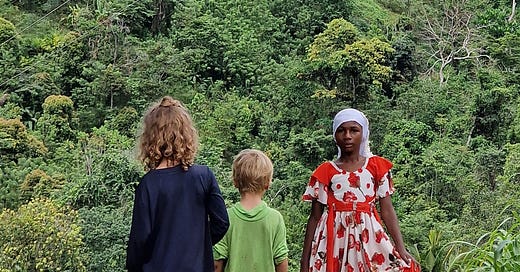


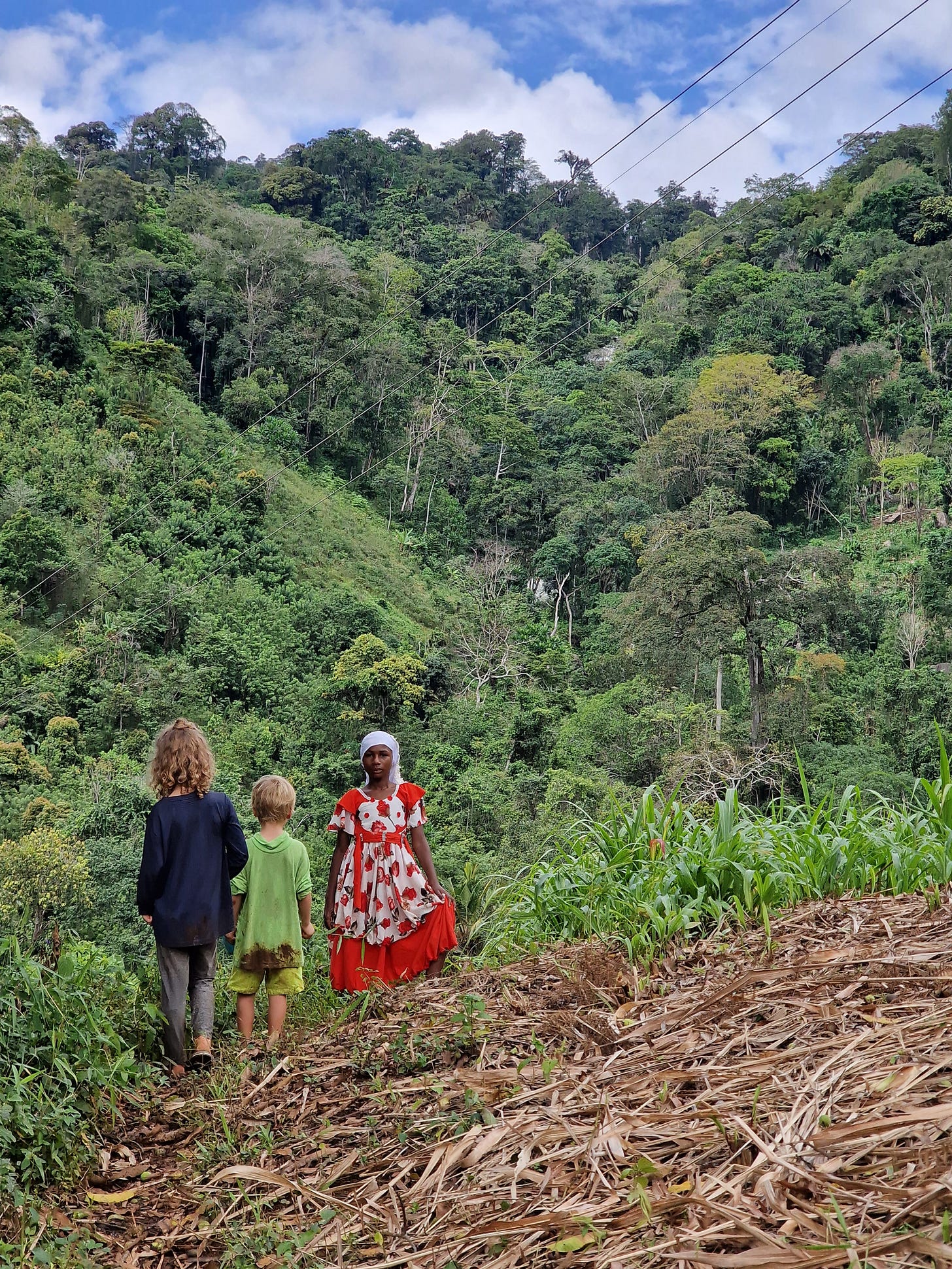
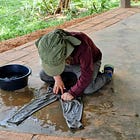
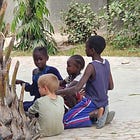
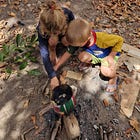



I totally agree we need to teach children how to talk to adults! I try to do this with my kids- for example, prime them with questions to ask . I also love how older people are shown respect, and reverence through greetings!
I'm loving your writing. Thank you! ❤️